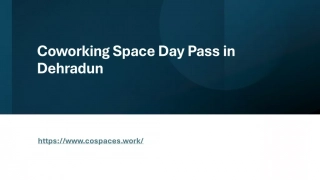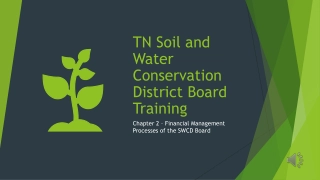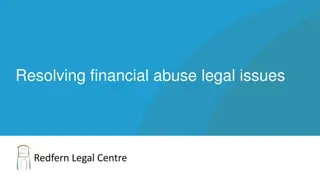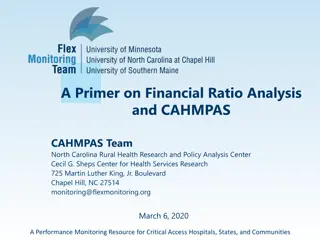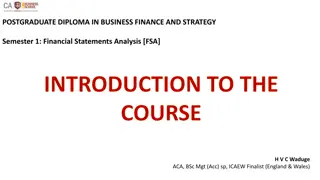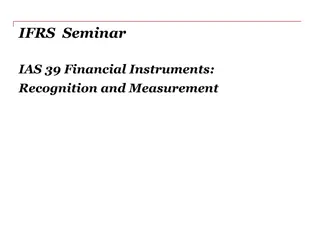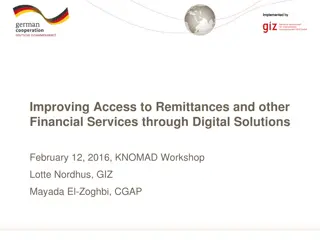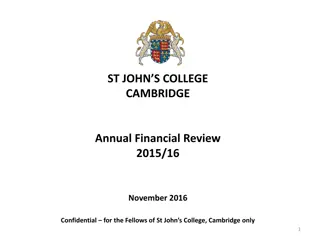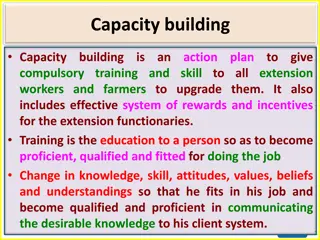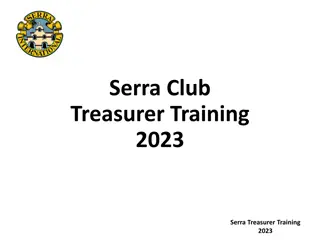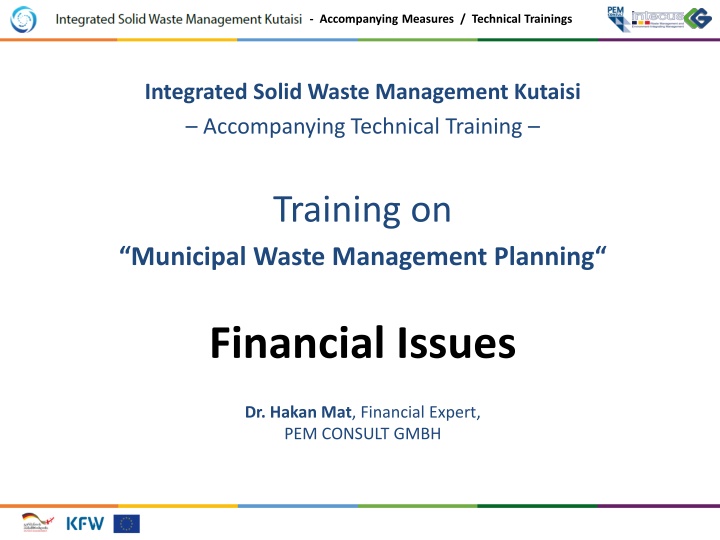
Solid Waste Management Financial Issues in Georgian Municipalities
Discover key financial issues in the management of solid waste in Georgian municipalities, including challenges with billing systems, fee collection, and cost coverage rates. Gain insights from the MSWM Performance Audit Report of the State Audit Office of Georgia. Explore potential solutions for improving financial sustainability in waste management.
Download Presentation

Please find below an Image/Link to download the presentation.
The content on the website is provided AS IS for your information and personal use only. It may not be sold, licensed, or shared on other websites without obtaining consent from the author. If you encounter any issues during the download, it is possible that the publisher has removed the file from their server.
You are allowed to download the files provided on this website for personal or commercial use, subject to the condition that they are used lawfully. All files are the property of their respective owners.
The content on the website is provided AS IS for your information and personal use only. It may not be sold, licensed, or shared on other websites without obtaining consent from the author.
E N D
Presentation Transcript
- Accompanying Measures / Technical Trainings Integrated Solid Waste Management Kutaisi Accompanying Technical Training Training on Municipal Waste Management Planning Financial Issues Dr. Hakan Mat, Financial Expert, PEM CONSULT GMBH
- Accompanying Measures / Technical Trainings Financial Issues Stated in MSWM Performance Audit Report of the State Audit Office of Georgia, Feb. 2015 Municipalities, where disposal services are provided, have no Billing system. Fee collection is not performed with well-established systems, which directly affects revenues of the municipal budget. Municipalities, where waste fees are more or less collected, the rates are unfounded and do not cover actual costs that are required for MSWM. Municipalities neither consider nor observe the tariff system analytically. Revenues are not determined based on affordable service fees and collection rates. WMP training December 14/15, 2016 Financial Issues 2
- Accompanying Measures / Technical Trainings Financial Issues Stated in MSWM Performance Audit Report of the State Audit Office of Georgia, Feb. 2015 Exact number of residents who receive MSWM services must be identified in the billing system so that electronic bills can be issued (nowhere in Georgia except Tbilisi and Batumi). In general, service fee collection is carried out by the collector based on hand-filled bills. If a resident is not at home when the collector makes his rounds, then the collector neither issues the bill nor transfers it to the resident, which further reduces the number of paying customers. WMP training December 14/15, 2016 Financial Issues 3
- Accompanying Measures / Technical Trainings Financial Issues Stated in MSWM Performance Audit Report of the State Audit Office of Georgia, Feb. 2015 MSWM Service Fee Collection Performance (2013) As per Law of Georgia on Local Fees (1998), maximum MSWM service fees: Residents = 3 GEL/capita/month (not to exceed 4 people per household) / Legal Entities & Org. = 25 GEL/m3 Municipalities Billing System Tariff Collection Rate Tbilisi Electricity Bill 2.5 GEL/ca/month 92% Batumi Municipal Database 1.3 GEL/ca/month 67% 38 Municipalities Collectors 0.2-1 GEL/ca/month (mostly 0.5 GEL/ca/month) 46% WMP training December 14/15, 2016 Financial Issues 4
- Accompanying Measures / Technical Trainings Financial Issues Stated in MSWM Performance Audit Report of the State Audit Office of Georgia, Feb. 2015 MSWM Service Cost Coverage Performance (2014) Municipalities Revenues (GEL) Costs (GEL) Cost Coverage Rate Tbilisi (6 months) 26,899,530 47,999,959 56% Batumi 1,495,541 6,307,610 24% 38 Municipalities 2,792,874 17,839,496 16% WMP training December 14/15, 2016 Financial Issues 5
- Accompanying Measures / Technical Trainings MSWM Service Fee Setting Rules Introduction of all local fees in a municipality is regulated by the decision of the Municipal Council (Sakrebulo) as per existing laws in Georgia. For MSWM service fees, Sakrebulo resolution should determine: (i) MSWM service fees for the residents and legal entities/ organizations (within limits set in the Law of Georgia on Local Fees); (ii) MSWM service fee calculation methodology; (iii) MSWM service fee payment rules and methods. WMP training December 14/15, 2016 Financial Issues 6
- Accompanying Measures / Technical Trainings Requirement of Applying Polluter Pays Principle As Per Waste Management Code of Georgia (2015) MSWM service fees charged to holders or producer of waste must cover the following costs: (i) solid waste collection and street sweeping; (ii) solid waste treatment; (iii) solid waste transportation to Transfer Stations or directly to Landfills operated by the SWMCG; (iv) recovery, recycling and re-use of recycled materials; (v) disposal / landfilling. WMP training December 14/15, 2016 Financial Issues 7
- Accompanying Measures / Technical Trainings Current Financial Issues That Need to Be Tackled and Resolved MSWM service fees are not set by considering Polluter Pays principle; Residential MSWM service fees are not determined by taking Affordability principle into account (socially vulnerable groups, updated waste producer database of residents and legal entities / organizations); Current level of MSWM service provision costs by type of waste and per ton cannot be calculated accurately by incorporating depreciation costs due to lack of precise data; Even though fees are introduced for residential waste generators, they are not applied seriously and payment of bills are not enforced if issued (thus coverage of billing services and revenue collection rate are very low); WMP training December 14/15, 2016 Financial Issues 8
- Accompanying Measures / Technical Trainings Current Financial Issues That Need to Be Tackled and Resolved MSWM service fees are collected mainly from the legal entities and organizations which are far from covering the full cost of service provision (even without disposal costs / gate fees at present); More efficient means of billing and collections are not sought for (incorporating MSWM service fees to electricity / water bills); Possible cost reduction methods by capitalizing on economies of scale (establishment of municipal associations for MWSM) are not evaluated; WMP training December 14/15, 2016 Financial Issues 9
- Accompanying Measures / Technical Trainings Current Financial Issues That Need to Be Tackled and Resolved There is very little willingness-to-pay by residents due to lack of public awareness which is neglected so far by the municipal administrations as a result of political concerns; There is very little willingness-to-charge by the municipal administrations due to expecting funding from the State which is not sustainable in the long-term. WMP training December 14/15, 2016 Financial Issues 10
- Accompanying Measures / Technical Trainings Discussion and Feedback of Municipalities Activities / accomplishments on MSWM costs / revenues / cost coverage / investment requirements ( current and future targeted levels (objectives) by type of waste and per ton) Availability and reliability of data on current and future targeted (objectives) MSWM costs / revenues / cost coverage / investment requirements For planning purposes, detailed Cost-Benefit Analysis must be conducted by the municipalities to determine the direct costs of various treatment alternatives quantitatively through preliminary estimates using local unit cost factors (as required in Annex 2 Section 6.1 of the Municipal Waste Collection By-law). WMP training December 14/15, 2016 Financial Issues 11
- Accompanying Measures / Technical Trainings Discussion and Feedback of Municipalities Raising MSWM service fees to full cost recovery level (taking affordability and time-phased fee adjustment into account) Introduction of efficient billing and collection methods Cost reduction policies (minimization of waste to be disposed, capitalization on economies of scale (cost sharing) through municipal associations) Improving willingness-to-pay and willingness-to-charge (public awareness raising) Other issues to be raised by the municipalities WMP training December 14/15, 2016 Financial Issues 12
- Accompanying Measures / Technical Trainings Specific Data Required from Municipalities (Homework) SWM service fees charged separately for residential and commercial/institutional/public entities in the last 3 years (2014-2016) (When did they introduce SWM service fees for the first time and did they make any increase since then?) Current rate of population served (current population served / total population in the municipal responsibility area) Current rate of commercial/institutional entities served (no. of commercial & institutional entities with separate contract / total no. of commercial & institutional entities in the municipal responsibility area) WMP training December 14/15, 2016 Financial Issues 13
- Accompanying Measures / Technical Trainings Specific Data Required from Municipalities (Homework) Current billing and collection rules and practices Current billing rate (population billed / total population in the municipal responsibility area)) and collection rate (amount collected in GEL/amount billed in GEL) separately for residential and commercial/institutional/public entities in the last 3 years (2014-2016) Current number of population who are legally not required to pay the SWM service fees (socially-vulnerable groups registered in the official database of the Social Service Agency, IDPs, others) (clear definition of such people and their legal basis) WMP training December 14/15, 2016 Financial Issues 14
- Accompanying Measures / Technical Trainings Specific Data Required from Municipalities (Homework) Actual cost of SWM service provision (breakdown of operations and maintenance cost items as personnel, fuel, repair / maintenance, depreciation, etc.) in Gel, Gel/ton and Gel/capita in the last 3 years (2014-2016) Actual amount of billed and collected SWM revenues (service fees and sales revenues from recycled materials, if any) separately for residential and commercial/institutional/public entities in Gel, Gel/ton and Gel/capita in the last 3 years (2014-2016) Investment expenditures incurred and their financing sources in the last 3 years (2014-2016) WMP training December 14/15, 2016 Financial Issues 15

